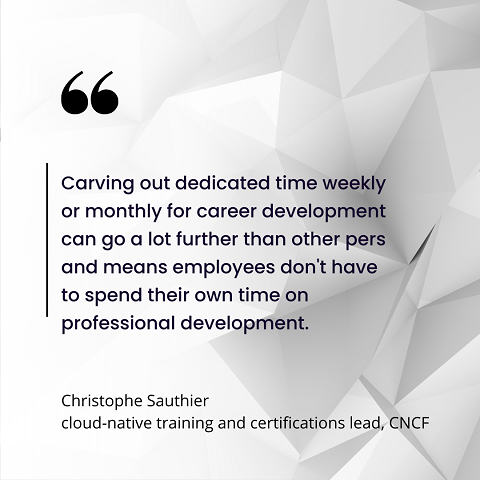Developers Eager for Additional Training, but Cost, Time Barriers Limit Progress
Completing new training and certifications offers distinct advantages for software developers. However, many organizations don't provide time or financial support for training, a new report finds.
September 30, 2023

As software developers struggle to keep up with the pace of software development, regular training can provide them with the skills needed to take advantage of cutting-edge technologies.
A global "microsurvey" from the Cloud Native Computing Foundation (CNCF) found 86% of respondents said completing new training and certifications or mentorships advanced their technical skills, meaning the technological benefits are clear.
However, cost was a barrier for 81% and 62% of people who wanted to complete a cloud-native certification or training, respectively.
Related: Guide to Becoming a Software Developer
Additional training doesn't just help an individual improve skills in an ever-changing industry — 36% said it led to higher pay. Of those who made more money, 53% received pay increases of more than 11%.
However, more than half (52%) of organizations do not offer time to pursue certifications, and 53% do not pay for training.
"Technology is continuously evolving to improve scalability and uptime and reduce costs, so organizations that don't stay up-to-date risk missing out to their competitors who do," said Christophe Sauthier, cloud-native training and certifications lead at CNCF.
He noted that paying for training is the most obvious way to support employee growth, but time is also a huge factor: Lack of time kept 43% and 36% of people from completing a certification or training, respectively.
"Carving out dedicated time weekly or monthly for career development can go a lot further than other pers and means employees don't have to spend their own time on professional development," Sauthier said.
The Benefits of Subscription-Based Model for Training
Many organizations that provide cloud training and certifications have started offering subscription-based models that make it easier and more economical for organizations to make training available to their employees.
Related: Angling for a Pay Raise: IT Workers Hold the Advantage
The Linux Foundation, which CNCF is part of, recently launched THRIVE-ONE, with options to fit different budgets and timing needs, Sauthier pointed out.
"With the subscription model, workers will more easily be able to access training without having to either pay themselves or ask their employer to pay each time," he explained. "It is also a way to let employees manage their own training time, meaning they can develop a regular cadence for training and maintain a more balanced workflow."

Sauthier-CNCF
Sauthier noted that conferences and community events are also great places to get a lot of information in a short space of time.
"Mentorships are another great option, especially for employees or individuals that are novices or just getting started on their cloud-native journeys," he said. "These programs allow participants to get hands-on experience working on developing and improving open source tools."
Training Improves Employee Loyalty, Confidence
More than two-thirds (69%) of respondents to the CNCF survey said they'd be more loyal to their current employer if they had more time to pursue career development efforts.
Related: AI-Assisted Coding: What Software Developers Need to Know
"This is because training, certifications, and mentorships have clear benefits beyond improved skills," Sauthier noted.
More than three-quarters (76%) of respondents said training helped their work confidence, while another 33% said it led to more fulfilling work.
This was also reflected in the Linux Foundation Training State of Tech Talent 2023 survey from earlier this year.
Training was identified as an increasingly important employee retention tool, with 50% of respondents citing it as a key incentive to stay with employers, up from 40% the year before.
"A training and certifications policy can also be an essential asset during hiring," Sauthier said. "By doing so, the candidate knows that a future employer is committed to helping them progress in their career and technological evolution, which allows an organization to stand out in a competitive market for the best talent."
About the Author(s)
You May Also Like




